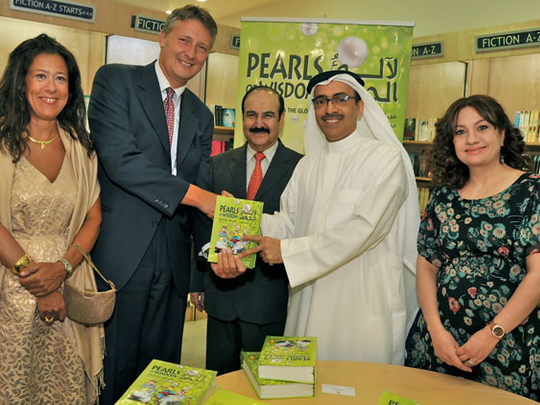
Manama: For most people, proverbs are defined as short expressions of popular wisdom. For Nayef Al Kalali, a Bahraini author and researcher, proverbs are much more. They have a life of their own.
"Like living organisms, proverbs evolve, streaming from fairly simple, new memorial structures to well-remembered and figuratively comprehensible forms," he said in his quiet voice.
"Proverbs are like living species for they undergo several stages before they reach their final form where brief rhetoric and unbounded gist come together. And unless proverbs are comprehensive in their sense, easy to understand and quick to be remembered, they can flee from memory easily as the Swedish proverb beautifully describes ‘Proverbs are like butterflies, some are caught and some fly away'," he said following a book signing ceremony at one of the largest bookshops in Manama.
The book "Pearls of Wisdom from the Gulf and the Globe" represents a compendium of the Gulf's most commonly used proverbs, featuring 1,001 proverbs translated from Arabic into English.
In 2007, his first book about proverbs was a hit in Bahrain and far beyond. Now, Nayef wanted to build on his success.
"I have not selected the subject of the book haphazardly," he said. "I am aware of its importance in our daily lives and in its ability to change people for the best and to keep pace with the times without compromising values. The collection was made after an extensive study of the many publications in the realm of proverbs and after I realized there was a lack of substantial translations of proverbs from the Arabian Gulf region.
"Our heritage deserves our best efforts to reveal it and show it to the world in an innovative way," he said as he signed off books for a group of enthusiastic readers that included Dr Abdul Husain Bin Ali Mirza, the minister of energy, and ambassadors, led by Enrico Padula, Italy's top envoy and Milena, his wife.
For Nayef, people need precise expressions for their feelings and must have the opportunity to share them with the world.
His vibrant passion for proverbs meant that he needed to build up a huge data, a task that required time, energy and careful selection. "His work is a labour of vibrant love that last three years," his wife, Sameera, said.
"In order to choose the most popular, I had to listen to and record many proverbs from family, friends, work colleagues and society in general."
Every occasion was an opportunity to augment the data.
"I recorded proverbs on the sidelines of official meetings, parliamentary sessions, field visits, social occasions and many other occasions," he said.
The 101 themes or chapters cover most facets of life in the Gulf environment, including love and unrequited love, friendship and associates, care and prudence, money and wealth, foolishness and stupidity, marriage, the falsehood and outward appearances of family and relations and failure and disappointment to mention a few. Many included the antithesis of the subject, Strength and Weakness, Content and Discontent, Assistance and Hindrance.
"I am sure that readers will be surprised to discover the great wisdom of proverbs from all civilizations. They invariably remind us of the truth we seek. This wisdom lies in the experience of all peoples of the earth together and is not confined to one civilization. It moves inexorably towards the others, taking a little from here, a little from there and in the end gives us an outstandingly wonderful legacy."
Yet, Nayef did face a dilemma while gathering proverbs.
"At first, I hesitated a lot about including vulgar sayings of the Gulf in this book," he said. "The Arabs have repeatedly insisted that not everything that is known can be told. However, when reviewing a number of references on proverbs I found that they did not exclude proverbs of this genre and considered them an integral part of the heritage of nations."
Eventually, he included some proverbs that included "obscene or lewd words" or that "may clash with noble religious values and ethical standards."
"I hope that they will not offend readers and I do apologise in case anyone felt offended," he said. "I am confident that everyone will appreciate their meaning and will understand that their significance or impact on our daily lives cannot be denied."
Dr. Mohammad Al Khozai, a banker and a friend who reviewed the book, said that Al Kalali's efforts, in addition to actual compilation of the proverbs can be understood and appreciated were commendable.
"Lots of efforts were put into this work," he wrote.
"There is the translation of the entry into English and which brought us closer to an equivalent proverb. There are also the transliterations of the entry and the paraphrasing or the provision of a similar proverb in English from other cultures. Thus, he provides a wealth of knowledge that can only be derived from a study of comparative exercises such as this."
According to Al Khozai, the new edition of the popular proverbs has demonstrated that Al Kalali "has utilized his talents both as a paremiographer and translator of high caliber to enrich the field of paremiology."












